 As partner in the Week of the Classics (Dutch: Week van de Klassieken) we present to you an extensive interview with well-known author Adrian Goldsworthy, who is specialised in Roman history. Adrian Goldsworthy (1969) completed a D.Phil in ancient military history at St. John’s College, Oxford. He used his dissertation as the foundation of his first book, The Roman Army at War 100 BC – AD 200. He has written several books about Ancient Rome, among others Caesar, Life of a Colossus (2006), Antony and Cleopatra (2010) and Augustus: First Emperor of Rome (2014). Because his book on Augustus has just been translated in Dutch and will be be available in stores this week, Goldsworthy was in the Netherlands a few days and our editor Vera Weterings had the opportunity to talk with him about his fascination with the Romans and his upcoming book Pax Romana. You can read about it in the interview below. Later this week, another questionnaire with Goldsworthy focusing on his latest book Augustus, will be published by us so keep an eye on our website.
As partner in the Week of the Classics (Dutch: Week van de Klassieken) we present to you an extensive interview with well-known author Adrian Goldsworthy, who is specialised in Roman history. Adrian Goldsworthy (1969) completed a D.Phil in ancient military history at St. John’s College, Oxford. He used his dissertation as the foundation of his first book, The Roman Army at War 100 BC – AD 200. He has written several books about Ancient Rome, among others Caesar, Life of a Colossus (2006), Antony and Cleopatra (2010) and Augustus: First Emperor of Rome (2014). Because his book on Augustus has just been translated in Dutch and will be be available in stores this week, Goldsworthy was in the Netherlands a few days and our editor Vera Weterings had the opportunity to talk with him about his fascination with the Romans and his upcoming book Pax Romana. You can read about it in the interview below. Later this week, another questionnaire with Goldsworthy focusing on his latest book Augustus, will be published by us so keep an eye on our website.
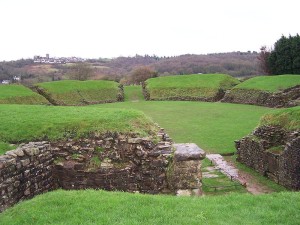
Q You have long been interested in Roman history, what inspired you to make it your specialism? What is it that intrigues you?
A I always found history of any period very interesting. When I see a book I can easily get distracted, but I think with the Romans as with many people here (read: in the Netherlands) it is growing up where there are Roman sites not far from where you live. The closest to me was what’s called today Caerleon: Isca Silurum, which was a Roman legionary fortress, the base of the Legion "II Augusta". So you have an amphitheatre there, you have parts of the walls, you have the barracks, you have a lot of inscriptions. To me it meant it was part of my history, the Romans had been where I grew up. The Greeks were interesting, but far away. The Egyptians even further away. The Romans they were part of something I could imagine. So I think it’s that, but I should be honest... Asterix books helped a lot as well! Because they were funny and I spend hours drawing the legionaries and the Gauls, but there’s something about the Romans. I can get interested in a lot of other things, but I always come back to the Romans. There’s just something exciting about them, they were never dull. You might not want them living next door to you, but there’s something that’s just interesting about them.
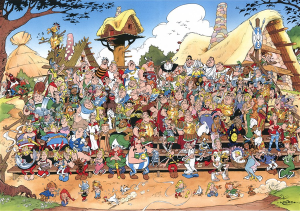
Q Funny you mention Asterix, as a matter of fact those particular comics are historically quite accurate, instead of what one might think in the case of a comic book.
A Given that it’s a comic strip it’s not bad really. And if that’s all the history you learn, at least in some way. Because today in Britain you’re not being taught the Roman era at any age in school. Sometimes very little about Roman Britain when you’re about seven, but obviously very simple. So it’s something people study much later in life in the university. So it’s good there are things like Asterix, to tell people that there was something happening.
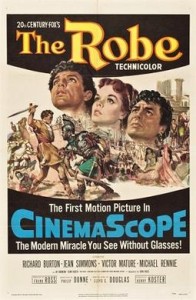
Q There are also a lot of books, movies and television series.
A Yes, at home the BBC would always show at Christmas time and at Easter time Ben-Hur and The Robe and all the Hollywood epics and I remember watching those and Spartacus and these sort of things. I think it added something, to this sense of the Romans. Even though you look at them and think ‘Oh, they’ve got so much wrong’. At least it gets people interested. And it helped me becoming interested. I’m glad people make them. Even if sometimes with the new ones, you look and think ‘they spend all that money, couldn’t they got it right’. But that’s not the priority of Hollywood.
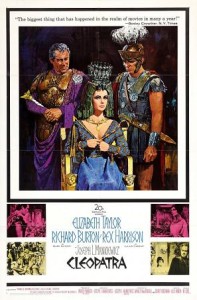 Q What do you think is the reason people are fascinated by Roman history and so many books and also plays in the past have been made about them?
Q What do you think is the reason people are fascinated by Roman history and so many books and also plays in the past have been made about them?
A People obviously they tend to think Antony and Cleopatra they know through Shakespeare, and maybe a little bit Elizabeth Taylor and Richard Burton. Caesar as well, again you’ve got Shakespeare or Robert Graves with the I, Claudius is very influential and in particularly the BBC did the dramatization of it. I think it’s the richness of it really. When you come back, there are so many interesting personalities and when you have Cicero’s letters for instance, you have all the gossip, the stories, things people were saying that didn’t turn out to be true. You get the jokes they told. The Romans can become much more human, than say when you look at Ancient Egypt. It remains very much a thing of monuments, great temples, great tombs, things that were put in the tombs and objects of everyday life. With the Romans you have more a sense of what they were like as people. There are still huge gaps in our knowledge, things we don’t know about the Romans, that we would love to know and so much of our evidence come from the wealthy. Archaeology can change that a little bit, but even then you leave more trace if you have more to throw away. And again, bigger buildings leave more trace. But even so, we just get a sense of the Romans and the literature is so mixed. When you’re looking at Augustus you’re dealing with virtues and horrors and Ovid and all the poets at the same time they give you a different view of how his life was like. So I think that there’s a richness and it’s still amazing that when you look back to have an empire that is so big and lasted for such a long time and has influenced our own culture to such a great degree. I find these days when I’m writing the books often people don’t have background in Ancient Greek, Latin or archaeology, but they read a book and suddenly they hear about crossing the Rubicon and things they didn’t think about. Like August was named after Augustus, because people never think about it. Or that our tenth month December is actually the twelfth month. When you explain that this is actually because of the Romans, because of Julius Caesar changed the calendar: they used to have ten months, they changed it to twelve under the Julian calendar and the last one, January and December, had to stay where they were because of all the festivals and the political year. When people are being told about the Romans, they start to think ‘oh, that’s why we do that’ and they see the connection even after 2.000 years. There is so much, I still find myself learning and I’m studying since I went to the university and I’m lucky enough to write about it and spend time going into this in detail and yet each topic I come to, there are things I didn’t knew. So, it’s a great world to explore.
Q Besides your non-fiction work, you also write historical novels about the era of Wellington and Napoleon. Why not about the Roman Empire since that’s your speciality?
A Well, actually I’m in the middle. I have to finish the first novel about the Roman period. I’m working on it at the moment. I’m a few weeks behind, I was hoping to have finished the first draft, but it would take another week or two when I got home. I just got a few more chapters to write. That other period, the period of Wellington and Napoleon, has always been a hobby interest. I always read a lot. You have a lot of information then, that you love to have for the Roman period. For example you get the accounts of people much lower down the social scale, you get the ordinary soldiers, the junior officers instead of just the great generals. When I started writing these novels, I wanted a break really. I thought it would be nice to go away a few months once a year and do something completely different. I’ve enjoyed doing it for that reason, I’ve written six of those. It’s been fun. Moreover, researching another period of history you learn something and sometimes you think ‘oh, that’s how they did a particular thing’ and you wonder if the Romans were actually doing that. As a twenty-first century person I wouldn’t think of that as a way of doing things. The thing that has struck me most about writing a Roman novel of fiction in that period, is actually how many things we don’t know. That I never thought about before. When you write a novel, your characters do things, ordinary things: they eat, they get dressed, they do these very basic things, much of them I’m not really worried about. When I think about Caesar or August, it doesn’t matter. So that’s been strange, it was very good to try and find out. But sometimes we don’t know. There are many things you’re just guessing about. For the first Roman novel I’ve taken stories from the Vindolanda tablets, from the site of Hadrian’s Wall. When you’re writing from a different level and not writing about the Caesars and Augustus, you’re much more aware of how mixed and diverse the population of the Roman army and empire is. Trying to bring that to live, but still there’s so much we don’t know.
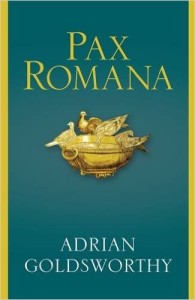 Q When you’re working on this fiction project, do you think the next non-fiction project might focus on the ordinary Roman people and their behaviour?
Q When you’re working on this fiction project, do you think the next non-fiction project might focus on the ordinary Roman people and their behaviour?
A It’ll be a little bit. Augustus came out in Britain in 2014, I have another book coming out in English in August. It’s a non-fiction book that’s called Pax Romana. The broad question is to look if the Roman Empire was really peaceful and what do we mean by ‘peace’. To look at that, I wanted to disable first of all: how does life change when the Romans arrive? What’s it like in the period of conquest? Because the Romans didn’t make this empire to make the world a peaceful place, so you have to look at the causes of expansions, of conquest, why the Romans were aggressive in that way. Moreover to compare them to other peoples. And to look at, when the Romans arrive, how people react to them. One of the striking things is how many leaders of communities never fought the Romans. They allied with Rome, because they saw Rome as a big strong friend against their neighbours. It were the neighbours they hated, the Romans were too far away to worry about. And then how life changed and the mystery really that you have in many areas rebellions early on, but in this part of the world [read: Western Europe] for instance, after Civilis, after the Batavian revolt there is nothing. In Britain after Boudicca, in low-land Britain, no revolt at all as far as we know. Neither Judea, that you think as an area that is so distinct culturally, after Hadrian there is no major rebellion. So why is it that the Romans were able to absorb people in that way? Why do people think this is worth accepting? So it’s looking at how government worked, how people use the system to their advantage and how they were treated.
Often you could only ask a question and then ‘well this is what we think, and this is what the archaeologists suggest’ and you have a little literature about a region. You can’t do a study of the economy of any area. You just don’t have the data. So it’s hard in that way: was the burden of taxation very heavy? It can’t have been so heavy that it ruined people, it can’t have been so heavy that they were forced to rebel, because neither of those two things happened. But beyond that you can’t really judge what it was like to be a Roman. Try to remind that before the Romans arrived, they usually paid tax to somebody even if it’s a local chieftain or a prince or king. Moreover people more often than not, were fighting wars against neighbours living not very far away. So that does stop and when we then look at the question of banditry: is it resistance against Rome, is it people that are out for the money, how common was it, how safe was the Roman Empire? In a sense it’s akin to the sort of things I’m thinking about for the novel.
Q Do you notice different forms of Romanisation in the different regions?
A Very much so. The one thing is that when you’re looking at a topic like this, it’s potential is so big, because every region is different. So much also depends on, we tend to know a lot about some areas because there is good archaeology there. Sometimes that’s because of the conditions and the preservation, sometimes it’s because there has been money more recently put into archaeological programs. So you have a lot of information about one region and nothing about somewhere 30 kilometres away. I try to balance that and give a sense of particular areas, I can’t do everything, I can’t go through each area of the Empire and say ‘well this is what is happening here’. To give a sense of the range, the different experiences under Rome.
One thing that has bothered me with a lot of recent studies, is that, particularly in English, they tend to present the peoples of the Empire as if they were simply doing as they were told and victims of the Romans. The Romans come along, conquer them. But when you look, actually there is far more of the ambitions and the needs of the peoples. Whether it’s to ally with the Romans rather than fight them. The way people work within the system, the number of rebellions that are actually been done by somebody that has quite done well: Arminius in Germany, Civilis in the Rhineland, Vercingetorix even in Gaul, Boudica in Britain. They all up to a point, done very well and they usually been allies within the Roman system, they are Roman citizens even in several cases. What tips you over? What goes wrong sometimes that makes you think ‘right, this is it’? I’m trying to give a sense and also to me it’s very interesting that when you get to the collapse of the Empire in the west, that you don’t have somebody who is saying ‘I want to be British’, ‘I want to be Spanish’ or a Gaul and be free. Because so many centuries have past that no one could really remember anything before Rome. Not in a way that appeals to them as something like ‘we must go back to the good old days’.
Q In history you see nationalism particularly thrive in the eighteenth and nineteenth centuries.
A Yes, very much so. It’s particularly notable in areas as Judea, Sumeria and in the East. But when people did rebelled, it’s the same as in Egypt, they usually turn to their neighbours first before they turn on the Romans. Again the people you really hate, live quite close. Because you don’t have a sense of being French or Britain. It’s a tribal identity and even that is often broken up to ‘I’m loyal to this leader’ or ‘I belong to this particular section’. The unifying force is Roman and there is nothing outside that offers anything like that. It’s always good whether you’re writing a biography about someone like Augustus or looking in more generally, to remind yourself that these are people, not just social trends. They are each individuals living their lives and they have lots of other priorities. It’s the same with Augustus, Caesar or Antony and Cleopatra. They are not just someone with a simple sense of ‘politically, this is what I want to do’. There are other factors as well and they’re not always rational.
Q Your upcoming book Pax Romana is about the whole empire as such, a huge topic. Did you choose a chronological or thematic approach to handle it?
A It’s a little bit of both, actually. The first section is about the Republic, it goes up to Caesar basically. I’m starting in Spain in the second century BC with the massacre of the Lusitanians with Servius Sulpicius Galba, who is then charged and goes back to Rome and is accused of braking faith, because that’s a clear case where the Romans aren’t peacemakers. It’s a reminder that the experience of conquest by Rome was often very brutal. But not always. When you go to other chapters you look at people who allied with Rome, the people who allied but then find they’re still fighting them. These are people like Ariovistus, the leader Caesar fights. He was been named a king and friend of the Roman people the year before and ends up being attacked by Julius Caesar. So how did that happened?
The one thing that always interests me, it’s something we get hints of because it’s not much discussed in the sources, is the number of Italians that were in an area long before the army arrived. All the traders, all the merchants, all the businessmen. The sense that there were a lot of these people out there, the contact with Rome begins far earlier. When the Empire stabilized, again these people are going a long way outside the Empire. You tend to look at themes, so you look at the major rebellions, but the lower level of resistance, you get some evidence for that in Judea, it continues for several generations. Why does that stop?
Another question. For instance when I look at a governor, how a Roman governor works, we draw quite a lot on Cicero and Pliny and compare the two, see how much is changed from the Republic to the Empire and then look at the frontiers and a few examples of regions and try and look more generally. We have all this archaeology of army bases, we’ve got inscriptions. But what were they exactly doing? Why were they there? How does each one differ? How does it works? Where is August? That’s a nice simple plan: he grows up, he does things, he dies. With this [read: the book Pax Romana] it’s more of a theme, but I try to keep some sense. I think it’s wrong to jumble everything together, because things do change. The Empire under Augustus was very different than the Empire under Hadrian. You need to be aware of these changes, so I try to do a bit of both.
Later this week the second and last part of our interview with mr. Goldsworthy will be published

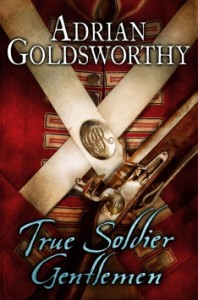
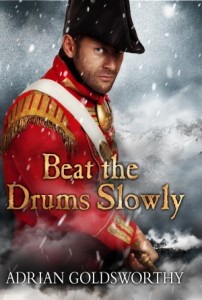
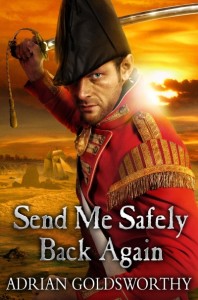
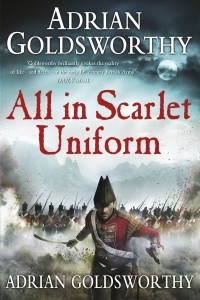
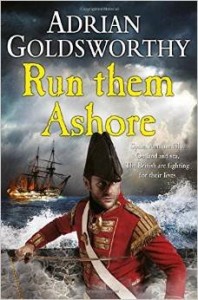
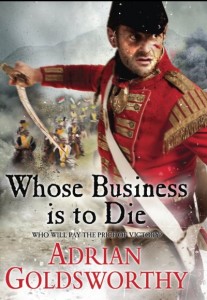
Pingback:
Augustus. Van revolutionair tot keizer van Rome |
Pingback:
Pax Romana |